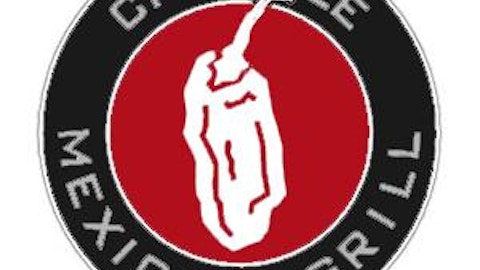When many investors think of an all-weather, recession-proof sector, they often think of the fast food industry. In the United States, the average American eats fast food four to five timesa week – a frequency that is unlikely to fluctuate greatly in times of economic prosperity or prolonged recessions. However, that generalization is broad and is better suited for assuring newer investors that big blue chip stocks with simple business models tend to outperform the market in the long run.

In addition, rising commodity prices can crimp margins and high exposure to struggling international markets can dent revenue growth. Therefore, should investors consider fast food restaurants good or bad long-term investments? Let’s take a look at several key trends moving the industry today.
McDonald’s is not a bellwether
For too long, McDonald’s Corporation (NYSE:MCD), the largest hamburger chain in the world, has been considered a bellwether stock of the fast food industry. However, investors shouldn’t use McDonald’s earnings as a yardstick to compare all other restaurants to, due to its high exposure to Europe and other troubled markets.
During the second quarter, McDonald’s Corporation (NYSE:MCD) adjusted earnings came in at $1.38 per share, up from the $1.32 it reported in the prior year quarter. Revenue rose 2.3% to $7.08 billion. McDonald’s earnings and revenue missed consensus estimates, which called for the company to earn $1.40 per share on $7.10 billion in revenue.
Although U.S. and total global same-store sales both rose by 1%, those gains were offset by flat performance across Europe and the Asia/Pacific, Middle East, and Africa (APMEA) region. Europe generated 39% of McDonald’s Corporation (NYSE:MCD) top-line in 2012, the U.S. comprised 32%, while APMEA accounted for 23%.
Same-store sales fell 0.1% in Europe due to weaker demand in Germany and France, and dropped 0.3% in the APMEA region on account of weak sales in Australia, Japan and China. However, sales in the U.K. and Russia remained robust.
Over the past year, McDonald’s Corporation (NYSE:MCD) high exposure to Europe and Asia have become liabilities rather than assets, throttling its growth in comparison to its rivals, which have more exposure to the U.S. market. Therefore, it would be unwise to consider McDonald’s to be a bellwether stock.
The Bistro Effect
Rather than pay attention to McDonald’s Corporation (NYSE:MCD) earnings, fast food investors should be aware of the “bistro effect” that is rippling throughout the industry. This idea, which started with Chipotle Mexican Grill, Inc. (NYSE:CMG) and Panera Bread Co (NASDAQ:PNRA), emphasizes higher quality, healthier food in a more upscale, bistro-like environment in comparison to low-end fast food restaurants.
That idea has paid off handsomely. Over the past five years, Chipotle Mexican Grill, Inc. (NYSE:CMG) and Panera Bread Co (NASDAQ:PNRA)’s revenue have surged 131% and 77%, respectively. By comparison, McDonald’s Corporation (NYSE:MCD) revenue only rose 16.5% during the same period. Chipotle sells Mexican food made from local, mostly organic ingredients, which is regarded as a healthier alternative to Mexican fast food from Yum! Brands, Inc. (NYSE:YUM)’ Taco Bell. Taco Bell responded to Chipotle’s popularity with its gourmet Cantina Bellmenu, which boosted sales considerably last quarter.
Panera Bread Co (NASDAQ:PNRA) popularized soup, salads, sandwiches and coffee in an urban bistro environment at lower prices than Starbucks. Starbucks fired back by acquiring La Boulange, a popular Bay Area bakery, to increase the quality of its baked goods.
Both Chipotle Mexican Grill, Inc. (NYSE:CMG) and Panera Bread Co (NASDAQ:PNRA) have stolen market share from cheaper fast food restaurants, which have been forced to renovate their stores and add healthier alternatives to their menus, as well as full-service restaurants, which suffer by comparison due to higher menu prices and tips.
Wendy’s gussies up, earnings surge
After The Wendy’s Company (NASDAQ:WEN) sold Arby’s, it struggled to reinvent itself to compete effectively against McDonald’s Corporation (NYSE:MCD) and Burger King Worldwide Inc (NYSE:BKW). Last year, Wendy’s unveiled a sweeping renovation plan to upgrade stores with more upscale, bistro-like features to mirror Panera Bread Co (NASDAQ:PNRA). It also changed its menu substantially, offering more premium burgers and sandwiches to distance itself from the Big Mac and the Whopper.
The Wendy’s Company (NASDAQ:WEN) recently announced that it was reducing the company ownership of its stores from 22% to 15%. By selling 400 stores to franchisees, Wendy’s reduces its overhead risk considerably, and as a result expects long-term adjusted EPS growth to start rising by the “mid-teens” starting next year, higher than its vague prior forecast for “single to double-digit” growth. At 15% company ownership, Wendy’s will own fewer restaurants than McDonald’s Corporation (NYSE:MCD), which owns 19%. Having a higher number of franchised restaurants generates a more stable income stream that relies on royalty fees and rent, rather than sales at individual locations.
The Wendy’s Company (NASDAQ:WEN) also reported strong second quarter earnings on July 23, earning $0.03 per share, or $12.2 million – a significant improvement from the loss of $0.01 per share, or $5.5 million, it reported in the prior year quarter. Adjusted to exclude one-time items, earnings came in at $0.08 per share, topping the consensus estimate by two cents.
Revenue climbed 1.8% to $650 million, falling short of the consensus estimate of $659.95 million – which can be attributed to weak same-store sales growth of 0.4% and 0.3% at company-owned and franchised locations, respectively. However, The Wendy’s Company (NASDAQ:WEN) expects same-store sales to climb 2% to 3% for the full fiscal year, based on high hopes for its innovativePretzel Bacon Cheeseburger. Wendy’s topped off those solid numbers was a 25% dividend hike to $0.05 per share.






